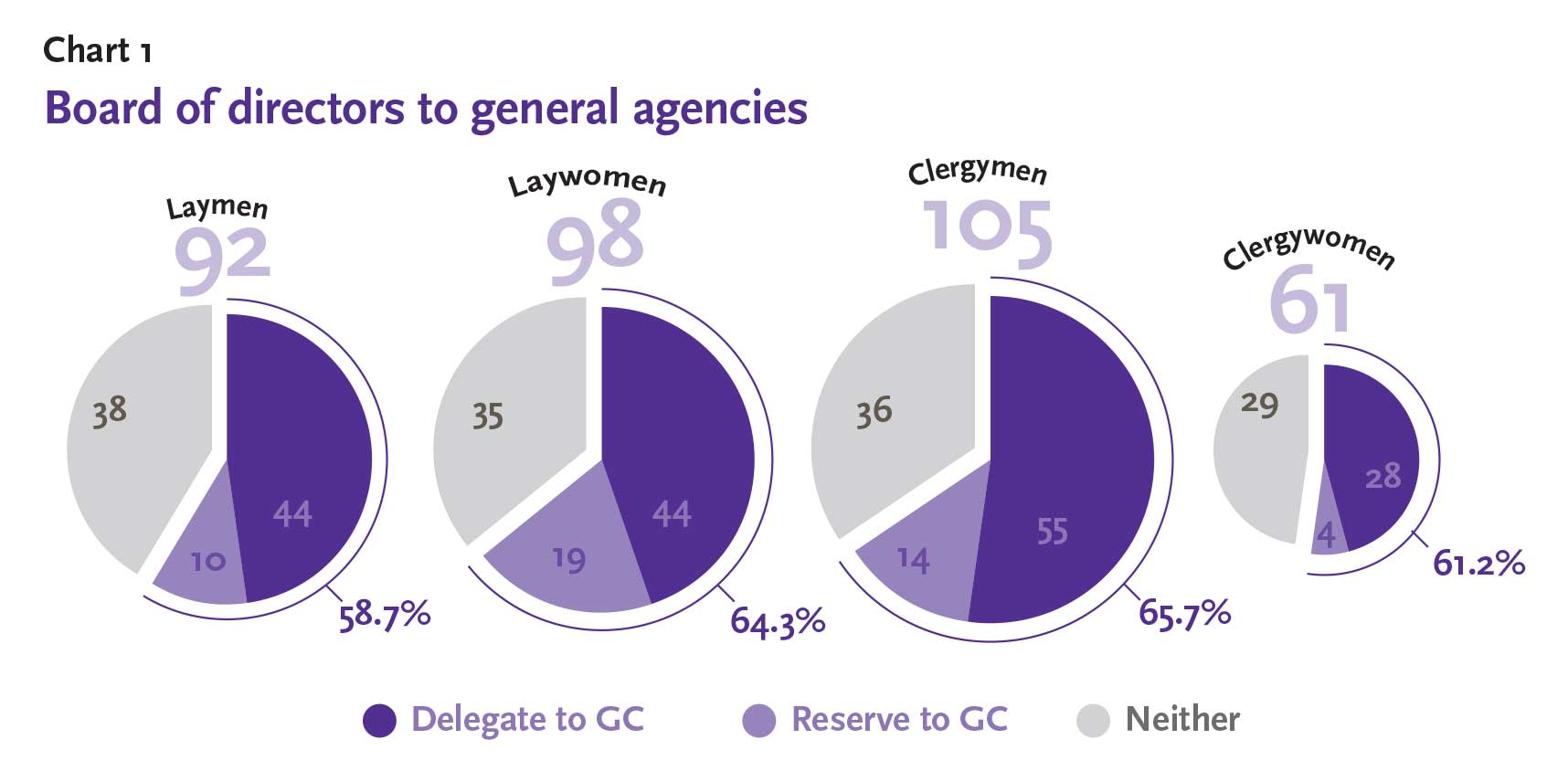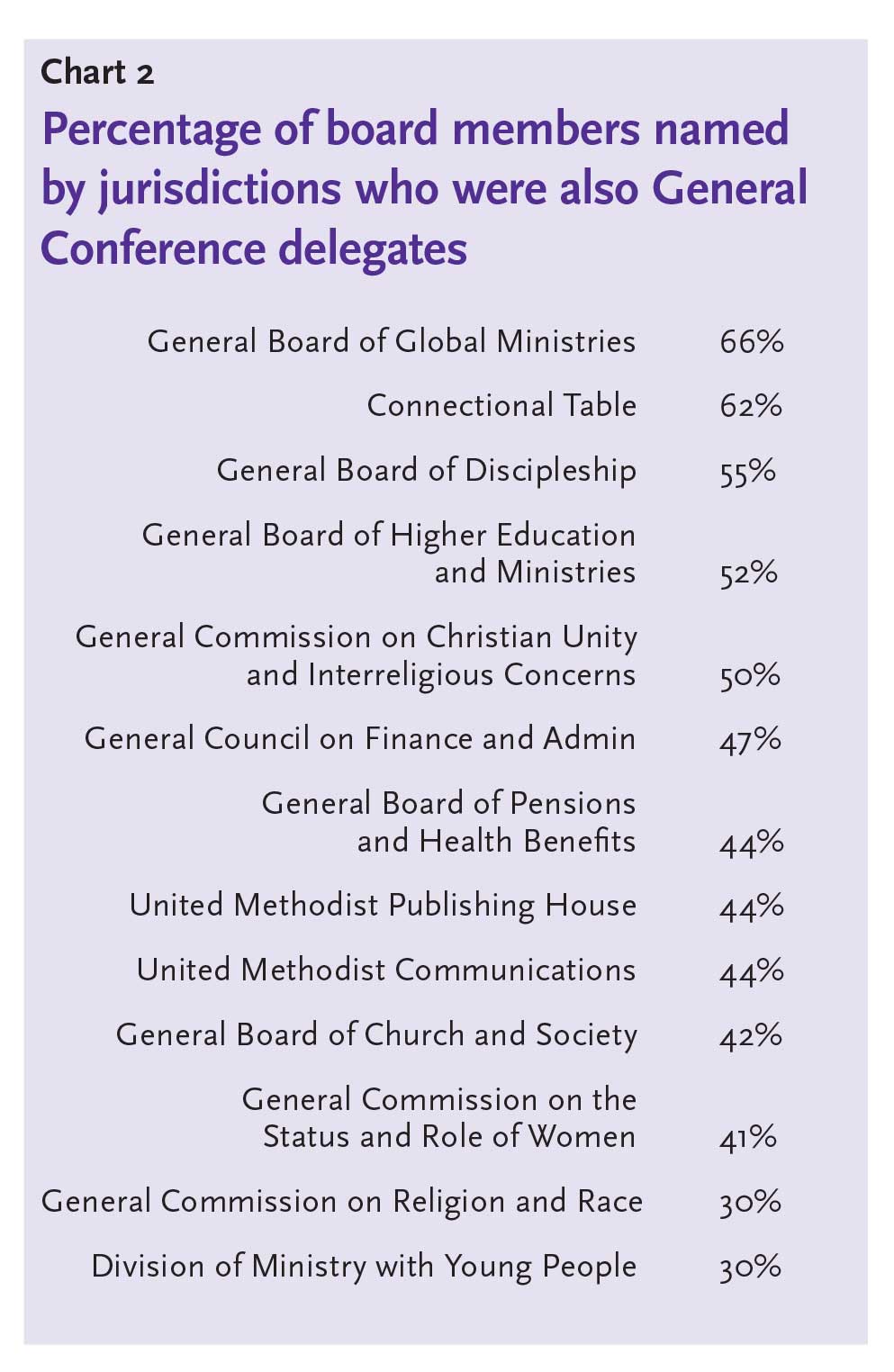By Lindsey Graham and Craig This
Six of 10 people who were delegates or reserve delegates to the 2008 General Conference were also named to the governing boards of United Methodist churchwide agencies—including the Connectional Table, which is not an agency per se, but which has oversight functions related to all other agencies (see Chart 1).
The percentage of General Conference delegates/ reserves who are also now agency governors ranges from 30 percent of members of the General Commission on Religion and Race (GCORR) to 66 percent of members on the General Board of Global Ministries (see Chart 2).
Do these numbers indicate that decision-making power in the denomination is in the hands of a toosmall and too-restrictive group?


Four program boards have highest percentages
On three of the four general boards—the General Board of Global Ministries (GBGM), General Board of Higher Education and Ministry (GBHEM) and General Board of Discipleship (GBOD)—more than half of their governing board members were also 2008 General Conference delegates or reserves. Historically, lay and clergy seeking agency membership have requested places on these three boards because they address missions, discipleship and leadership.
These focuses were of particular emphasis for delegates of the 2008 General Conference, which affirmed four areas of focus for the church’s work in the coming years: leadership development, ministry with the poor, global health and “creating new places for new people.”
Because of the Connectional Table’s oversight function, over half of its members has served at General Conference. It may be argued that having delegates/reserves on the Connectional Table is beneficial because these members know the spirit of the actions taken by General Conference and bring that understanding to their role.)
Commissions have lowest percentage of delegates
The lowest percentage of delegates are board members of commissions. The General Commission on Christian Unity and Interreligious Concerns (GCCUIC), half of whose members has served at General Conference compared to the two other mission-specific commissions, the General Commission on Religion and Race (GCORR) at 30 percent, and the General Commission on the Status and Role of Women (GCSRW), at 41 percent.
Given the emphasis on the global nature of the church, the growing membership and our work with Methodist-related entities beyond the United States, a greater emphasis can be found on ecumenical and interreligious concerns.
Also, the mission-specific nature of GCORR and GCSRW tends to attract a more focused, specialized group of individuals to do its work. However, there may also be a tendency to stereotype when it comes to assigning governing members to these two commissions. Specifically, women and people of color may be encouraged to choose membership on these two agencies, even though the voices and perspectives of men and white people are also needed to help the church successfully address and counter institutional sexism and racism.
GCSRW especially attracts voting members who have never served on another churchwide agency, while the larger boards tend to have veteran members from other agency governing boards. In many ways, GCSRW helps train new persons on how to serve as effective voting members.
Do General Conference delegates bring continuity or complacency?
General Conference delegates serving on general boards and agencies can play an important role in the continuity of the work of the general boards and agencies in receiving mandates from General Conference and from quadrennium to quadrennium. Delegates and reserve delegates participate in and listen to the debate and the conversations around the issues being voted on at General Conference. When these persons are then assigned to churchwide agencies, they may bring that collective history and knowledge.
Additionally, the greater the percentage of General Conference delegates serving on an agency, the less drastic the learning curve for continuing the work of these boards and commissions. Commissions such as GCORR and GCSRW tend to spend more time on educating and training their members because they have a greater percentage of newto-general-church leaders. To ensure that these commissions are able to implement their missions to the fullest extent, perhaps the denomination should focus on bringing a balance of new and experienced voting members to each board and agency, including the commissions.
Lindsey Graham is website coordinator for GCSRW.
Craig This is data analyst in the Department of
Institutional Research at Wright State University in Ohio.
